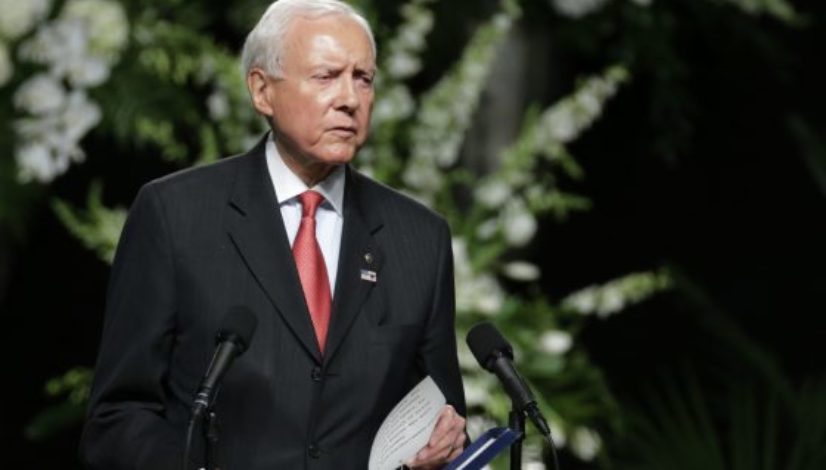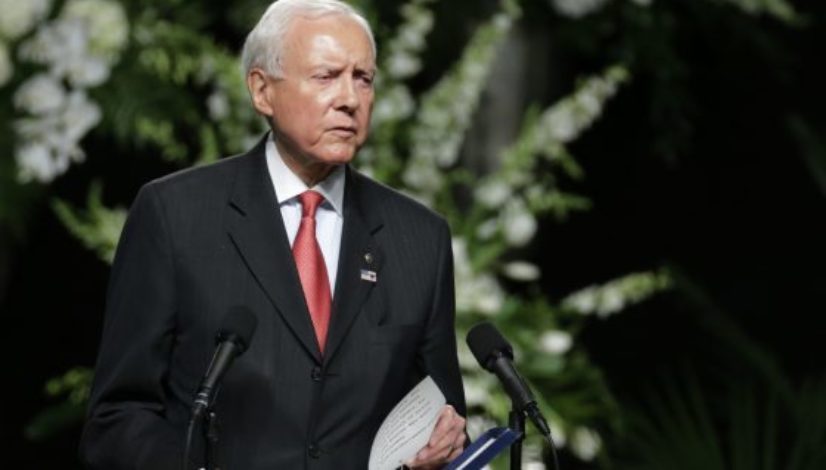Sen. Orrin Hatch pushes to ease marijuana research barriers with MEDS Act

Published: Sep 13, 2017, 1:25 pm • Updated: Sep 13, 2017, 5:10 pm
By Aleta Labak, The Cannabist Staff
There’s a bipartisan effort underway in the Senate for easing the path to marijuana research.
Sen. Orrin Hatch, R-Utah, announced Wednesday that he and Sen. Brian Schatz, D-Hawaii, are introducing the Marijuana Effective Drug Study Act of 2017, or MEDS Act. The legislation was previously introduced by Schatz in 2016. Signing on as co-sponsors are Sens. Cory Gardner, R-Colo.; Chris Coons, D-Del.; and Thom Tillis, R-N.C.
One aspect of the MEDS Act is to help research progress more expeditiously.
“Regulatory acrobatics can take researchers over a year if not more to complete, and the longer researchers have to wait, the longer patients have to suffer,” Hatch said in a speech on the Senate floor, citing the current government restrictions on cannabis research.
In a statement filled with weed puns that was issued earlier Wednesday, Hatch said:
“It’s high time to address research into medical marijuana. Our country has experimented with a variety of state solutions without properly delving into the weeds on the effectiveness, safety, dosing, administration, and quality of medical marijuana. All the while, the federal government strains to enforce regulations that sometimes do more harm than good. To be blunt, we need to remove the administrative barriers preventing legitimate research into medical marijuana, which is why I’ve decided to roll out the MEDS Act.”
Related stories
- Rohrabacher-Blumenauer medical marijuana protections extended by debt limit deal
- House Rules Committee hears key marijuana amendments
- Marijuana fight puts Congress on collision course with Sessions
- Sen. Cory Booker intros marijuana bill focused on racial justice, descheduling, funding
- Senate committee, rejecting request from Sessions, keeps protection for medical marijuana states
During his floor speech, Hatch reiterated that statement and went on to add:
“Puns aside, it will surprise no one that I’m strongly against the use of recreational marijuana. I worry, however, that in our zeal to enforce the law, we too often blind ourselves to the medicinal benefits of natural substances like cannabis.”
“We would be remiss if we threw out the baby with the bathwater,” Hatch said in regards to studying the benefits of medical marijuana in treating chronic medical conditions.
Among the objectives of the MEDS Act, the bill seeks to:
• Encourage more research on the potential medical uses of marijuana by streamlining the research registration process, without imposing a scheduling determination on the Drug Enforcement Agency (DEA);
• Make marijuana more available for legitimate scientific and medical research and the commercial production of any FDA-approved drugs derived from marijuana;
• Retain important checks to protect against diversion or abuse of the controlled marijuana substances;
• Require the National Institute on Drug Abuse (NIDA) to develop and publish recommendations for good manufacturing practices for growing and producing marijuana for research;
• Require the Attorney General to increase the national marijuana quota in a timely manner to meet the changing medical, scientific, and industrial needs for marijuana;
• Prevent the Department of Health and Human Services from instituting any other marijuana-specific protocol reviews, other than the voluntary review that a researcher can request from National Institutes of Health (NIH) in order to access the expedited DEA registration process.
Watch Hatch’s speech on the MEDS Act:
Topics: congress, federal, federal legislation, medical marijuana, research, u.s. senate  Aleta Labak
Aleta Labak
This Colorado native joined The Cannabist in January 2014 as a digital producer, after working behind the scenes for The Denver Post since 1999 in News, Features and Sports as a copy editor and designer. These are fascinating times,…




